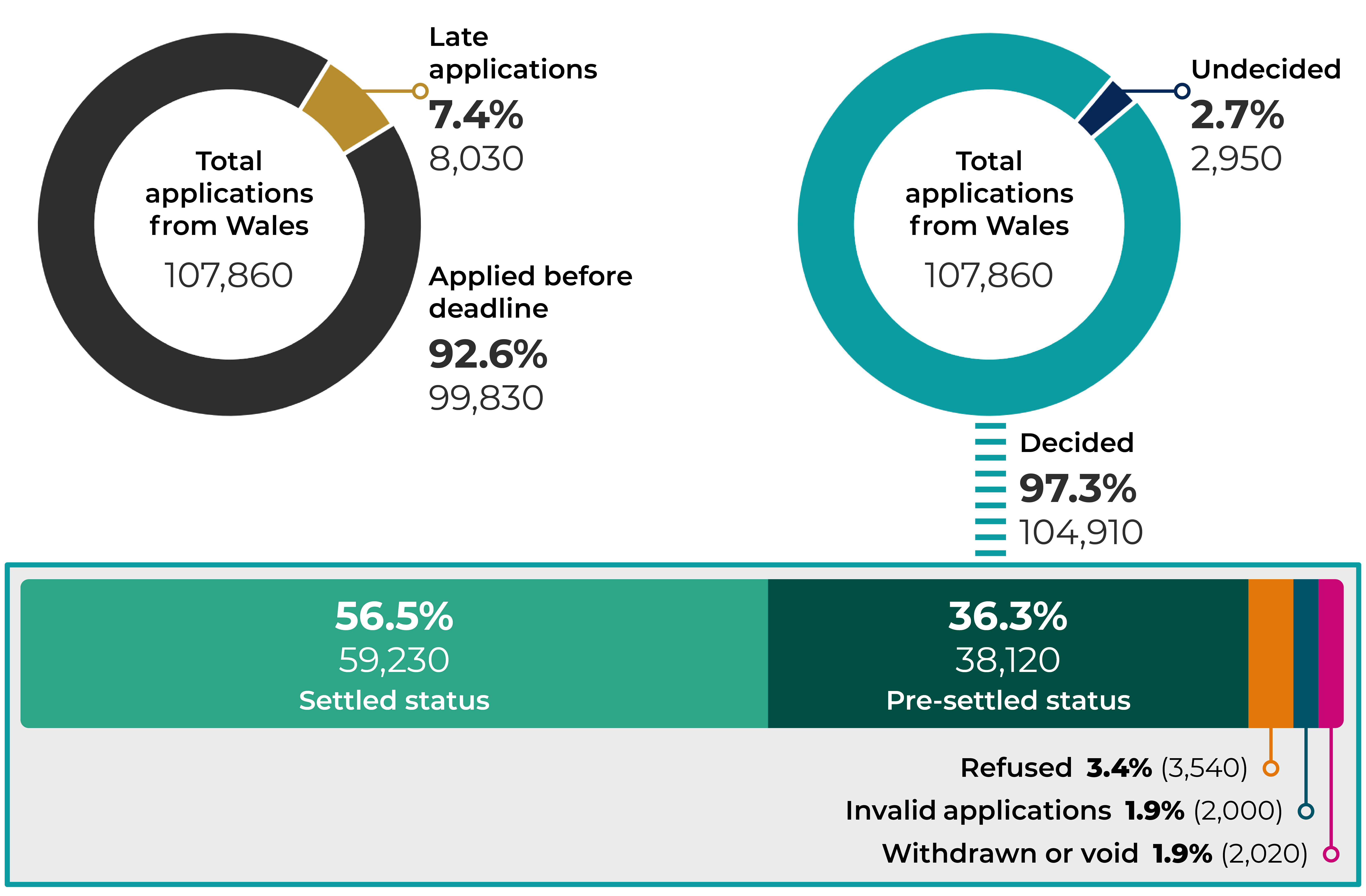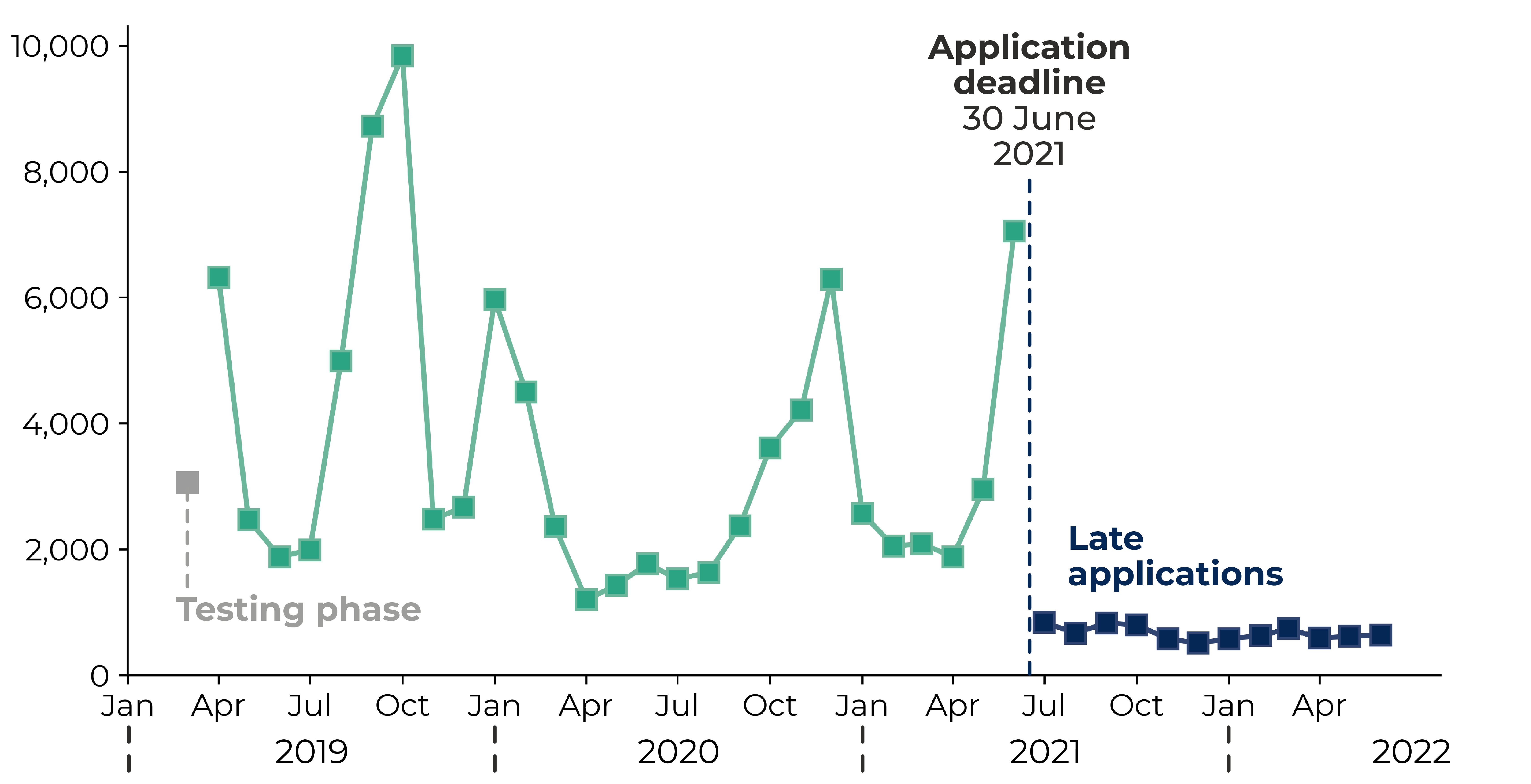Europeans who lived in the UK before Brexit have had to apply to stay.
Almost 6.7 million applications had been made to the UK Government’s EU Settlement Scheme (EUSS), as of 30 June 2022.
Successful applicants are given a temporary (“pre-settled”) or permanent (“settled”) status. Pre-settled status expires after five years and must be converted to settled status via a second application. The EUSS application deadline passed on 30 June 2021 but it remains open for late and second applications.
Although immigration is the responsibility of the UK Government, the Welsh Government provides public services and support in Wales and says it wants Europeans living here to stay.
The Senedd’s Equality and Social Justice Committee (“the Committee”) is monitoring the EUSS in Wales, continuing the Senedd’s focus on changes to freedom of movement after Brexit.
This article is the latest in our series on EUSS statistics and summarises the Welsh Government’s response to the Committee’s first annual report in July 2022.
Latest data on applications
Up to 30 June 2022, 107,860 applications were received from Wales, surpassing estimates of 95,000.
The majority of applications were from people aged 18 to 64 (85,650 applications, or 79.4%). 18,880 applications were from under 18s (17.5%), and 3,330 from over 65s (3.1%).
EUSS applications from Wales by date, concluded applications and outcomes by percentage and number

Source: UK Government EU Settlement Scheme quarterly statistics, June 2022
The Committee has kept a close eye on late applications because they are only allowed in limited circumstances, and people who don’t apply can lose their rights. The number of late applications from Wales increased from 6,180 at the end of March to 8,030 at the end of June.
EU Settlement Scheme monthly applications received in Wales

Source: UK Government EU Settlement Scheme quarterly statistics, June 2022
The Committee’s findings and the Welsh Government’s response
The Committee’s annual report asked key questions about the Welsh Government’s EUSS support. The Minister for Social Justice, Jane Hutt said the Welsh Government “stands with the Committee in its advocacy for EU/EEA and Swiss citizens” and is already addressing the Committee’s key findings in some capacity.
The table below shows the Minister’s response to issues raised by the Committee:
|
ESJ Committee report |
Welsh Government response |
|
Concerns relating to statistical gaps in the number of pre-settled citizens seeking to convert their status to settled. Whether the Welsh Government is able to identify pre-settled citizens in order to provide tailored support, including reminders to convert their temporary status to permanent before it expires. |
The Welsh Government is unable to determine when repeat applications will need to be made. It has requested more detailed data but UK Government staff have said it’s not within their remit to publish it. The Home Office has since provided assurances to the Welsh Government that it will send timely reminders to pre-settled citizens to apply for settled status and confirmed that the first pre-settled statuses will expire mid-2023. The Welsh Government’s response details steps taken to support pre-settled citizens, including targeted digital campaigns and the dissemination of expiration reminder cards. |
|
To seek the Welsh Government’s view on month-on-month increases in late applications from Wales during the first quarter of 2022. Whether the Welsh Government is aware of any particular issues for this, or any issues relating to citizens who have not applied at all. |
The Welsh Government is not aware of particular issues relating to late applications and has been advised by the UK Government that “no EU citizen in Wales has had any rights revoked due to not making an application to the EUSS to date.” |
|
Continued funding for the Welsh Government’s free advice and support services for Europeans in Wales applying to the EUSS. |
The Welsh Government’s free advice and support will continue to the end of March 2023. Welsh Government is reviewing EUSS advice services in Wales. |
|
How support for Europeans trying to stay in Wales is coordinated between the Welsh and UK governments. |
The Welsh Government is aware that some Welsh organisations receive UK Government funding but it has not been made aware of future UK Government funding plans. UK Government is invited to the Welsh Government’s EUSS Coordination Group. |
|
UK Government closed the EUSS’ Family Permit Scheme for Ukrainian family members fleeing the war. Whether the Welsh Government is aware of how many Ukrainians in Wales applied to the EUSS. |
The Welsh Government is “very disappointed” by the UK Government’s decision not to extend the application deadline of 29 March 2022, despite calls from the Welsh and Scottish governments to keep this route open in light of Russian invasion of Ukraine. This route is now closed unless family members can meet narrower late applications criteria. The Minister notes that the UK Government’s data shows only ‘non-EEA’ applications, and so it does not know how many Ukrainian arrivals in Wales applied to the EUSS. |
|
Request key findings and outcomes resulting from the Welsh Government’s review of a recent Migration Observatory report. |
Not addressed. |
|
Request the latest minutes of the Welsh Government’s EUSS Coordination Group, which are ordinarily shared with the Committee. |
Minutes of three meetings provided. |
Next steps
The Committee discussed these issues with the EU’s European Economic and Social Committee at the Senedd in October. Its follow-up committee, which maintains UK-EU links after Brexit, will report on the implementation of the Withdrawal Agreement using evidence and views gathered during its UK tour.
On 1-2 November, the High Court began hearing the Independent Monitoring Authority (IMA)’s case against the UK Government. Current UK Government rules mean that pre-settled citizens automatically lose their rights if they fail to either convert their status, or reapply for pre-settled status. The IMA brought a judicial review against the UK Government because it believes its position is unlawful under the Withdrawal Agreement, which protects the rights of UK and EU citizens living in each other’s territories.
The Equality and Social Justice Committee agreed on 21 November to await the outcome of the High Court case before considering its next steps. The next round of EUSS data is due to be published on 24 November 2022.
Article by Sara Moran, Joe Wilkes and Helen Jones, Senedd Research, Welsh Parliament






